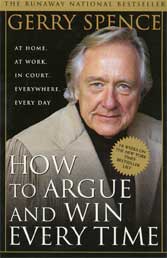
"I heard the judge speak those fateful words I had longed for, and dreaded. 'Mr. Spence, you may begin your argument.' I glanced quickly at the jury. They were watching me as I walked toward them, waiting to hear me, waiting to judge me. Could I answer the U.S. attorney? Would the jury believe me? Would I measure up? I felt like running. Trapped, I, like the lion felt like charging. My heart was racing. I was afraid. God Almighty, I am always so afraid!
"Then I looked down at my feet and I tried to feel where the fear actually lay. There it was, where I always found it, pressing at my ribs on each side, up high. I looked up at the jury. 'Ladies and gentlemen of the jury,' I began. 'I wish I weren't so afraid,' I heard myself saying. 'I wish after all these years in the courtroom I didn't feel this way. You'd think I would get over it.'
"Some of the jurors looked astounded. Here was this lawyer who had fearlessly guided the defendant's case through the cross-examination of over half a hundred mostly hostile witnesses - the FBI, the marshals, the experts. Here was this man who seemed always able to prevail now confessing his fear. They watched. They waited. Their tentacles were out - feeling, probing.
"'I'm afraid I won't be able to make the kind or argument to you that Randy Weaver deserves,' I said. 'After nearly three months of trial, I'm afraid I won't measure up. I wish I were a better lawyer.' As always, the fear began to slink away and the argument began to take its place, one that was to consume nearly three hours. It was an argument that was honest, and angry and humorous, one that was punctuated with defects and false starts and syntax that would horrify any self-respecting English professor. It was an argument that was a real as I was able to be - an argument that, in the end, was to free my client."
--Gerry Spence, How to Argue and Win Every Time
He shook Randy's hand, shook the hands of the defense team, and—as he always did—let the jury in on his fear as if it were some secret. “I’ve been at this for over forty years, and I never begin any case the way I feel right now. . . . I think to myself, can I do what I need to do now? . . . I need to be the best lawyer I can be in the next two hours and thirty-five minutes.”
And then he talked about the jury. Two jurors were in their seventies, three in their sixties, and only one was younger than forty-three. Spence said he hoped he didn’t offend them, but he guessed their average age was forty. “You may be the most important jury that’s come along in a decade,” he said. “This is a watershed case. . . a case kids in law school are going to read about.”
During the trial, Judge Lodge had ruled that Spence had to remain in one place, something the lawyer called “a spastic embrace” with the podium. Now Spence was allowed to move around the courtroom and he ran like an unleashed dog. He walked over and knelt next to Randy, looking into his eyes. “Randy, I’ll tell you what you’re guilty of. You’re guilty of being one stubborn mother. You are guilty of being afraid.” He looked up the jury. “And aren’t we all guilty of being afraid?”
Spence threw everything he could think of into his argument. This was no time to be subtle. He accused the government of a cover-up and spun out new theories—Vicki was murdered because they thought she was a witness at the roadblock. Degan’s own men shot him. He told a story about a talking swan and another about a boy who crushes a bird. Federal agents were “the Waco boys” and “the new Gestapo in America.” He introduced his wife Imaging and had her stand, introduced Weaver’s daughters and had them stand twice (“I want him to walk out and be free with his little children.”), clapped his hands in front of Lindquist’s face and yelled, “Wake up!” at the prosecutor.
Like a man stumbling around in a dark room, Spence’s argument was all over the place until—as always—he found the switch and turned on the lights.
His voice boomed through the courtroom. “Marshals aren’t supposed to shoot little boys in the back!” Sara shuddered. “A little boy whose voice hadn’t even changed!” Rachel sat up straight and squeezed her aunt’s hand. “This is a man who has been the victim of a smear and had his wife and son killed. And I don’t want him hurt anymore.
“This is a murder case,” Spence said. “But the people who committed the murder have not been charged, and the people who committed the murder are not here in court.
“Randy Weaver was not a criminal,” Spence said. “He had no propensity to commit crimes. This is a man who never even had a traffic accident, never even had a traffic ticket. Never been charged with a crime of any kind and honorably served his country.
“I want to talk to you about. . . punishment. Randy Weaver would willingly go to the penitentiary for the rest of his life if he could have his boy back. Randy Weaver would go to the penitentiary for the rest of his life. . . if he could have Vicki back. Hasn’t he been punished enough? Doesn’t this terror and this horror have to end sometime? Shouldn’t it end with you, and shouldn’t it end without having to compromise? Shouldn’t this jury have the courage to stand up and say, ‘No, they overexercised their power.’ I ask you to do that.”
[From Jess Walter's Ruby Ridge: The Truth and Tragedy of the Randy Weaver Family (Harper, 1995), pp. 352-353.]
